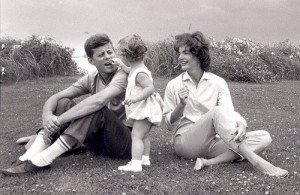 John F. Kennedy entered the White House with his young family in January 1961. He was the youngest man elected president of the United States, and the only Catholic so far. He only served for about three years, or a thousand days, but his legacy remains among the most widely discussed and debated. H.W. Brands focuses on two episodes more than any other: the Cuban Missile Crisis and the civil rights protests that escalated dramatically in the early 1960s. How would you assess Kennedy’s leadership in those pivotal areas? Kennedy’s successor, Lyndon Johnson, seemed far less glamorous than Kennedy and yet he achieved more revolutionary change in domestic legislation than any president since Franklin Roosevelt. How did he accomplish so much so quickly during the mid-1960s? Which legislative actions were the most historically significant? Which proved to be the
John F. Kennedy entered the White House with his young family in January 1961. He was the youngest man elected president of the United States, and the only Catholic so far. He only served for about three years, or a thousand days, but his legacy remains among the most widely discussed and debated. H.W. Brands focuses on two episodes more than any other: the Cuban Missile Crisis and the civil rights protests that escalated dramatically in the early 1960s. How would you assess Kennedy’s leadership in those pivotal areas? Kennedy’s successor, Lyndon Johnson, seemed far less glamorous than Kennedy and yet he achieved more revolutionary change in domestic legislation than any president since Franklin Roosevelt. How did he accomplish so much so quickly during the mid-1960s? Which legislative actions were the most historically significant? Which proved to be the  most controversial? Taken together, these various programs, dubbed “The Great Society” by Johnson and his admirers, represented a dramatic transformation in the role of the federal government. Take a moment and try to identify some of the biggest changes in American life and politics that had occurred in the century since the end of the Civil War.
most controversial? Taken together, these various programs, dubbed “The Great Society” by Johnson and his admirers, represented a dramatic transformation in the role of the federal government. Take a moment and try to identify some of the biggest changes in American life and politics that had occurred in the century since the end of the Civil War.

D'Andre Battle
In assessing Kennedy’s leadership in the aforementioned pivotal areas, I would say that Kennedy was largely concerned with keeping up appearances. Although I think this is true for most presidents, it seemed a bit more explicit with Kennedy. In terms of the Cuban Missile Crisis, he was very aware of the perception Congress and citizens had of him as weak in dealing with Cuba. His decision to then begin presenting himself as tough and making public and explicit references to war proved to be counterintuitive because it limited the transparency he could have concerning the entirety of the resolution with the Soviets. In other words, he couldn’t be completely honest or consistent in his leadership in dealing with Cuban Missile Crisis. In terms of his leadership regarding Civil Rights, Kennedy’s disposition was evidence of his political understanding. Although speaking against the segregationist south in private, Brands notes that Kennedy was aware that a civil rights bill was not likely to pass through Congress. But from the vantage point of the Black Americans experience this segregation, to deferring action to a later time was not the response desired in the nations leader.
Brands gives great historical context to Johnson and allows the reader to understand that Johnson had spent many years in politics and that his presidency was something he knew would be in his future. Johnson accomplished legislative actions including Medicare, Medicaid, Headstart and other education related policies. In answering the question “How did he accomplish so much?” I will have to paraphrase the quote Brands cites of Johnson’s adviser Clark Clifford. In short, Johnson was the most popularly voted, had a myriad of loyal government constituents and he became president without any commitments being made to any sort of special interest group which gave him the freedom to act and accomplish what he saw fit.
Participant
I think that the differences between Kennedy and Johnson and their time in leadership are very interesting. While Kennedy had a relatively easy time with the Cuban Missile crisis with his televised confrontation/ negotiation, he did not do as well in his leadership with the civil rights battle. It seemed very strange to me that a president who does well with his public appearance and reputation would have such a difficult time answering civil rights questions on a platform where he previously excelled (television). The fact that his successor, Johnson, despite not being anywhere near as comfortable or attractive in the face of society, and despite their similar viewpoints of the support of civil rights, managed to be more successful in his leadership during that civil rights battle is a little surprising. Especially when you consider that Johnson was from Texas, a state that, due to it status as both southern and western, it seems all the more incredible that he managed to use his the fact that he was from there in order to convince others that might not be as supportive of civil rights to support him and help his success in instituting one of the most sweeping civil rights bills in history. Johnson’s status as a master of policy and information seemed to help him show some superior leadership skills over Kennedy, who in his own right (as a poised and comfortable public figure) a talented president himself.